The ‘manual of repression’ shared by modern tyrants
Practices such as arbitrary detention, torture, or the use of artificial intelligence to control dissidents are common in most authoritarian regimes, according to activists gathered at the Oslo Freedom Forum
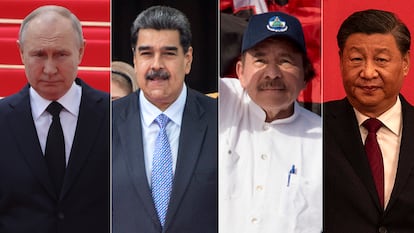

Tyrants learn from each other, share information, and observe the tactics of repression used by the world’s dictators and autocrats to reproduce in their own countries. Arbitrary arrests of dissidents, torture in prisons, attacks on activists’ family members, or the use of artificial intelligence to control the population are repeated almost systematically in most authoritarian regimes. “From Egypt and Iran to Russia and Venezuela, dictators copy and cooperate with each other,” warns Iranian journalist and dissident Masih Alinejad. Her denunciation coincides with the account of the dozens of defenders of human rights gathered last June at the Oslo Freedom Forum, the activist convention organized every year by the Human Rights Foundation (HRF). Their testimonies make up what could be considered a guide to the actions of modern dictators and autocrats, a set of traditional forms of repression reinforced by the options offered by new technology and the constant concern over their public image.
Arbitrary arrests
The arbitrary detention of activists, journalists, or opponents without legitimate reasons or without due process is “a fundamental weapon of autocratic regimes,” says Félix Maradiaga. He is one of the 200 Nicaraguan political prisoners whom Daniel Ortega’s regime banished to the United States last February after depriving them of their nationality. “They know that by arresting dissidents they divert attention from political movements, which are forced to pause for a while and stop talking about reforms in education and health or addressing issues such as corruption,” he continues. His own experience is proof: after announcing his pre-candidacy for the presidency of the country in 2021, he was arrested on charges of “treason” and spent “611 agonizing days in one of the most atrocious maximum-security prisons in Latin America.”
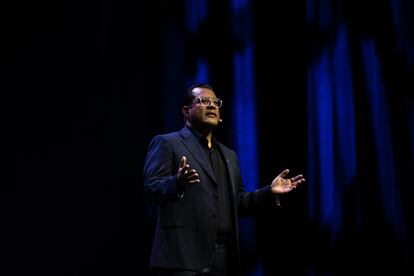
The aim of these arrests, according to Venezuelan journalist Victor Navarro, is to spread terror. “Autocratic regimes feed on fear and are strengthened by silence,” he summarizes. He too was detained “arbitrarily.” “I worked in social reintegration, but in Venezuela offering opportunities can be considered a crime,” says the activist, who was accused of “treason” and “terrorism.” “About 35 police officers broke down the door of my house,” he recalls. He was locked up for five months.
“They know that by arresting dissidents they divert attention from political movements, which are forced to pause for a while and stop talking about reforms in education and health or addressing issues such as corruption.”Félix Maradiaga, Nicaraguan political prisoner
Uighur Gulbahar Haitiwaji, on the other hand, had “never been involved” in political or social activities. But Xi Jinping’s regime found her guilty of “disloyalty to the Chinese government,” as part of Beijing’s crackdown on members of the Muslim minority — some 11.6 million people — in the Xinjiang autonomous region. “I lived in France with my husband and daughters and, following a call from my former employer, I planned a two-week return trip [to Xinjiang]... I had no idea what was waiting for me there,” recalls the woman, who spent three years in so-called “re-education centers,” internment camps where Beijing exercises its crackdown on Uighurs.
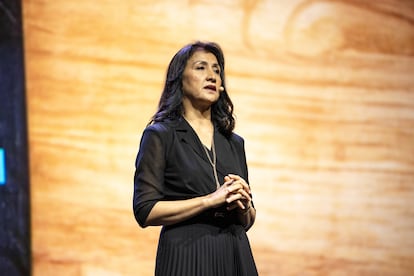
Torture
Beatings, rape and inhuman and degrading treatment are a constant in the testimony of those who have been arrested for political reasons. “In prison I suffered things that I am not yet prepared to talk about in public,” says Nicaraguan Maradiaga.
Torture is first and foremost an attempt at “dehumanization,” Navarro says. “I was number 25510806,” the code he was assigned after entering Venezuela’s Helicoide prison. The aggressions, he reveals, were continuous. “They wouldn’t let me sleep; I heard another prisoner being suffocated, the sound of rape...,” recalls the activist, who says he went 129 days without seeing sunlight.
A red bracelet on Haitiwaji’s ankle reminds her that she survived torture in Xinjiang detention centers. The officers squeezed her shackles so tightly that they made her bleed. And in the midst of the pain, she says she whispered: “My poor ankle, you have suffered so much for me, if I ever manage to leave this place I promise that I will adorn you with a beautiful chain.” It was one of the many times the woman was interrogated in one of the so-called “tiger chairs”: “They put a black hood on us, handcuffed our hands and ankles.” But those were not the only times she was tortured: “I was chained to a bed for 20 days and the humiliation I felt was unbearable. I struggled for 10 days not to relieve myself in front of them. In the end, with a very strong pain in my stomach, I relieved myself in tears.”
The one who cannot recount the torture he suffered is Alaa Abd El-Fattah. This blogger and intellectual symbol of the Egyptian opposition has been imprisoned for almost four years after being convicted in an express trial for allegedly spreading false information on social networks. But one of his sisters, Sanaa Seif, speaks on his behalf and says that the situation is so terrible that her brother had even thought about suicide: “He said that his life was unbearable, because the worst thing was not torture, but that they deprived him of everything that gave meaning to his life, such as sunlight, music, and books... He said he lived like an animal.”
Attacks on family members
In their strategy of spreading terror, dictators and autocrats strive to show that a dissident’s activism puts their family at risk. This is what happened to Haitiwaji. “They questioned me about my life in France, they showed me a photograph of my daughter covering herself with an East Turkestan flag [symbol of the Uighur independence movement] during a protest,” recalls the woman, who ended up signing a confession in which she declared that she had “gathered people to disturb the social order.”
Sanaa Seif did end up in prison three times for demanding her brother’s freedom. Aware of the pain that the detention of a loved one inflicts on families, she recounts how she combed her hair and put on makeup to try to look her best during the 20-minute visit with her mother or sister that the authorities allowed her once a month.
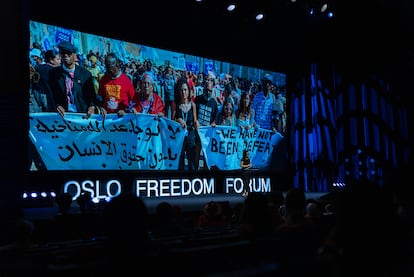
Beyond the arrest itself, the psychological damage caused to families by the detention of a family member is very profound. “When they arrested me, my mom was told to look for me at the morgue,” Navarro laments. Sharing a similar anguish is Evgenia Kara-Murza, wife of Russian journalist and President Putin’s political opponent Vladimir Kara-Murza, who was sentenced to 25 years in prison for high treason because “his voice was a danger to Putin’s regime.” “The pain of having someone you love in prison is immense,” she says.
Kleptocrat practices
“It happens in Sudan, in Yemen, in Russia, in China, in Iran... They are kleptocrat regimes,” says Casey Michel, HRF’s program director against systems of governance that prioritize the enrichment of the rich at the expense of the public interest. Kleptocracy is, according to Casey, one of the hallmarks of authoritarian systems, but warns that it is “a transnational phenomenon.” “Autocracies and dictatorships use the financial secrecy of places like Delaware [United States] to take money out of their country, whether it’s Equatorial Guinea or Angola, and enjoy it wherever they want,” he complains.
This is well known to activist Ketakandriana Rafitoson, the only judge in Madagascar who has resigned due to interference in justice, has spent her entire life dedicated to the fight against corruption. “This is the source of extreme poverty in my country,” she stresses, a state in which 75% of the population lives on less than $2 a day. “Successive leaders chose corruption as a way to govern the country,” she laments. And, as an example, she gives a figure that she considers unaffordable: “In 2013, one of the candidates for the presidential elections spent $43 million (€38.3 million) on a single campaign, in a country where people go hungry.” “If 36 candidates participated in the 2018 elections, how much money was wasted?” she asks.
“It is a mistake to believe that there are different dictatorships, right and left, socialist and capitalist, when the reality is that it is a question of good and evil.”Thor Halvorssen, founder of the Human Rights Foundation
The big mistake, according to Thor Halvorssen, founder of HRF, is “to believe that there are different dictatorships, right and left, socialist and capitalist, when the reality is that it is a question of good and evil,” he states. This classification, “whose objective is to divide people,” leads one to think, according to Halvorssen, that Venezuela’s regime is, for example, socialist. “But it’s not, because everyone in power is a millionaire or a billionaire,” he says.
The care of the international image
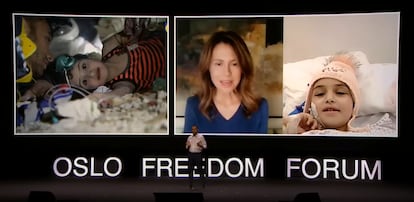
Asma al-Assad, the wife of Syrian President Bashar al-Assad, held a video call last March with Sham Sheikh Mohammed, a nine-year-old Syrian girl who survived the earthquakes that struck Turkey and Syria on February 6, while she was receiving treatment in a hospital in Abu Dhabi. “She was trapped for more than 40 hours,” says Syrian activist Abdulrahman Almawwas, co-founder of the White Helmets, the Syrian volunteer organization specializing in rescues. The hurtful thing about that call is that the girl Assad phoned lived “in northern Syria, an area that has been attacked and bombed by Damascus for the last 10 years,” explains Almawwas, who also criticizes how dictators try to “clean up their crimes before international public opinion.”
But the most recent illustrative example of how authoritarian regimes try to whitewash their image is, for Sanaa Seif, the celebration of the United Nations Climate Summit in the Egyptian town of Sharm el Sheikh in November of last year. “Abdel Fattah al-Sisi’s regime didn’t want the stories of political prisoners to spread, so I took the risk of flying there,” she said. Her brother was on hunger strike at the time to demand improvements in his detention conditions. “Climate activists from all over the world chanted the name of Alaa and [British Prime Minister] Rishi Sunak, [German Chancellor] Olaf Scholz and [French President] Emmanuel Macron called for his release,” she recalls. Her brother’s prison conditions suddenly improved.
The use of new technology
Rwandan activist Carine Kanimba’s mobile phone was infected with Pegasus spy software. The young woman, daughter of Rwandan opponent Paul Rusesabagina, the famous former manager of the Hotel Mille Collines — which Hollywood immortalized in the film Hotel Rwanda — has been protesting since 2020 that her father was kidnapped from his home in San Antonio (Texas) and taken to Rwanda, where he was convicted of terrorism and sentenced to 25 years in prison. Resesabagina, an opponent of President Paul Kagame, “would never have traveled” to the African country, says his daughter, who with the help of several organizations says she discovered that the Rwandan government had been “tracking the whole family.”
“All dictatorships do the same things, although they seem to be very different; for example, now they have started using artificial intelligence and facial recognition cameras,” explains Serbian activist Srdja Popovic, promoter of the student mobilizations that precipitated the fall of former Serbian dictator Slobodan Misolevic, and current director of the Center for the Application of Nonviolent Actions and Strategies (CANVAS). So it was for Haitiwaji. “When they arrested me, they took blood samples, scanned my face and irises and recorded a sample of my voice,” she says.
And dictators share these systems, warns Nathan Law, one of the leaders of Hong Kong’s so-called umbrella revolution. “China has taken advantage of the preoccupation of the narrative that prioritizes security over freedom and sells technology that serves to identify people,” warns the young man, currently exiled in London. This software, remember, has only one purpose: to suppress protests and ensure the survival of the regime.
Sign up for our weekly newsletter to get more English-language news coverage from EL PAÍS USA Edition
Tu suscripción se está usando en otro dispositivo
¿Quieres añadir otro usuario a tu suscripción?
Si continúas leyendo en este dispositivo, no se podrá leer en el otro.
FlechaTu suscripción se está usando en otro dispositivo y solo puedes acceder a EL PAÍS desde un dispositivo a la vez.
Si quieres compartir tu cuenta, cambia tu suscripción a la modalidad Premium, así podrás añadir otro usuario. Cada uno accederá con su propia cuenta de email, lo que os permitirá personalizar vuestra experiencia en EL PAÍS.
¿Tienes una suscripción de empresa? Accede aquí para contratar más cuentas.
En el caso de no saber quién está usando tu cuenta, te recomendamos cambiar tu contraseña aquí.
Si decides continuar compartiendo tu cuenta, este mensaje se mostrará en tu dispositivo y en el de la otra persona que está usando tu cuenta de forma indefinida, afectando a tu experiencia de lectura. Puedes consultar aquí los términos y condiciones de la suscripción digital.








































